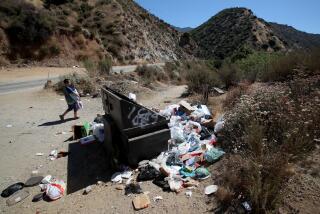Couple Near End of Long Litter Walk
- Share via
ASTORIA, Ore. — An Anaheim couple who have walked across the country picking up trash for 12 months are down to their last few white garbage bags.
*
Glen and Susan Hanket, both 38, have walked more than 4,000 miles across the nation’s highways, from New England to the Northwest. They have picked up about 3 1/2 tons of society’s leftovers in all their forms: from foam cups to old bras, tennis shoes to cigarettes.
Today they will make the last leg of their cross-country trek, going from Astoria, Ore., to Fort Stevens State Park on the northwest tip of the state.
“It feels pretty neat,” said Glen Hanket, who has worn out three pair of heavy boots. “It’s hard to believe we’ve made it 4,100 miles. It was a good way to see the country and do something productive.”
In 1992, the just-married couple were looking for a reason to take a long trip together. Both avid hikers, the Hankets were driving home on the San Diego Freeway back from a softball game in Irvine when they saw a big pile of trash on the freeway. That gave her an idea: Fighting litter seemed like a good theme for a cross-country walk.
The Hankets started their long journey in April, 1993, to call attention to the nation’s trash problem. They set out from Acadia National Park in Maine, and at Shenandoah National Park, Va., turned west and made a beeline to St. Charles, Mo., with litter sticks in hand.
“We picked up an inordinate amount of underwear,” Glen said. “We picked up just about everything: pornographic books in Polish, a butterfly collection and foreign coins.”
*
Idaho is the messiest state in the union, according to the Hankets.
“I couldn’t figure out why, but that’s the state where we picked up the most trash by far. It was a whole lot of beer cans and bottles. There was one stretch of 50 yards where we picked up three full bags of cans and bottles.”
They have slept in parks and motels, as well as the houses of people they met along the way. As the environmentally conscious pair moved from town to town with their tent and backpacks, they left behind bulging trash bags on roadsides where state transportation workers could pick them up as they passed.
Throughout their journey, mostly on side roads and state highways, people applauded their efforts to spruce up. But there were a few exceptions.
“We had one person tell us, ‘I’m not going to pick anything up. That’s why I pay taxes, so someone else will do that.’ ”
But the trash-bagging trip hasn’t been easy. Blisters were just the start.
Susan, a former teacher’s assistant, had to stay off her feet for seven weeks after she tripped on a porch in Maine last year and broke her leg. She was forced to give up the walk for good after she broke her arm near Vancouver, Wash.
Not satisfied to stay behind, she followed her husband in a rented car the rest of the way to Oregon, logging 12 to 15 miles on the highway pavement daily.
Today, Glen Hanket, a software engineer, will leave the highway and take narrower roads to Fort Stevens State Park, where the Columbia River spills into the Pacific Ocean.
Patrick Lines, a park administrator, said, he’s not scheduled to work today, but he might go in anyway.
“I want to meet these guys.”
More to Read
Sign up for Essential California
The most important California stories and recommendations in your inbox every morning.
You may occasionally receive promotional content from the Los Angeles Times.













